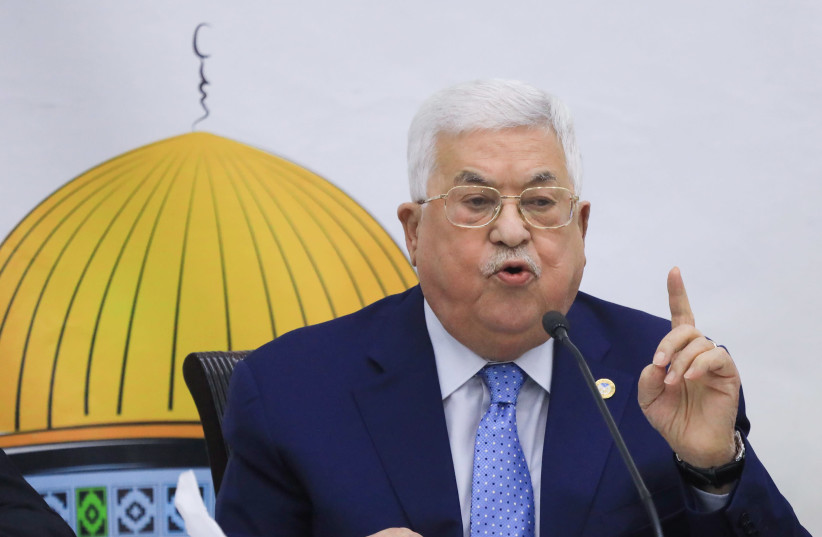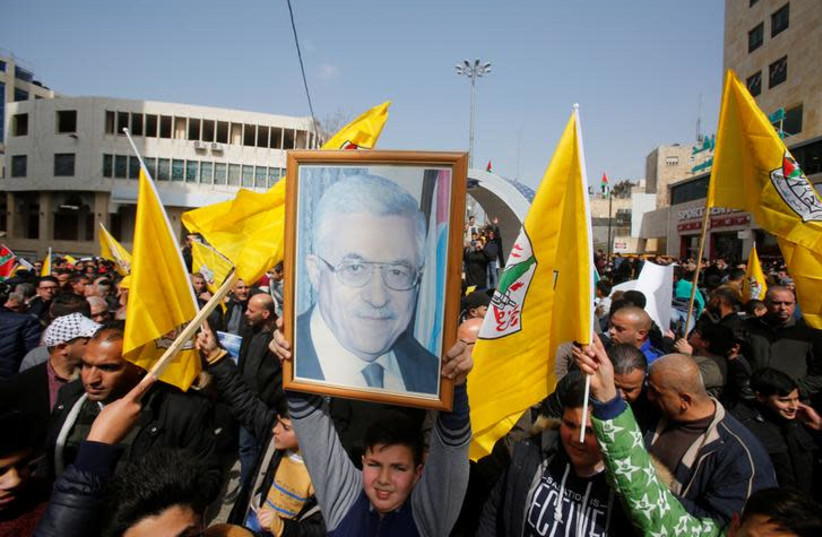Palestinian Authority President Mahmoud Abbas is facing increased pressure to convene the general assembly of the ruling Fatah faction to make decisions that would pave the way for his loyalists to tighten their grip on the Palestinian leadership and possibly determine the identity of his successor.
The Fatah assembly, also known as the Fatah General Conference, is supposed to convene every five years to endorse the faction’s “political and military programs” and elect members of its two major decision-making bodies: the Fatah Central Committee and the Fatah Revolutionary Council.
The committee is often described as Fatah’s executive branch, while the council is seen as its legislative body.
The last (seventh) meeting of the Fatah General Conference took place in November 2016 and lasted for five days. At the meeting, attended by 1,411 delegates, Abbas was reelected as general commander of the faction.
The conference elected members of the committee and the council, and fully endorsed Abbas’s policies regarding the peace process with Israel.

Multiple delays
The Eighth Fatah General Conference was scheduled to take place in November 2021, but Fatah Secretary-General Jibril Rajoub, who is regarded by some Palestinians as a leading candidate to succeed Abbas, announced that the gathering had been delayed until March 2022. At the request of Abbas, it was further postponed until last May.
According to Palestinian sources, the conference was again called off – this time until further notice – after sharp differences erupted among senior Fatah officials over the size of the representation Fatah-affiliated security prisoners held in Israeli prisons should be given in the faction’s institutions.
Blocking Barghouti
THE DISPUTE over the security prisoners is believed to be part of an attempt by Abbas and some of his loyalists to prevent jailed Fatah leader Marwan Barghouti and his supporters from holding key positions in the faction, the sources said.
Barghouti, who is serving five life sentences for his role in terrorist attacks against Israelis at the beginning of the Second Intifada, was elected by the last two Fatah conferences (in 2009 and 2016) as a member of the Fatah Central Committee, a move that was not well-received by Abbas and a number of top officials of the faction in the West Bank.
Last year, Barghouti, in an open challenge to Abbas, announced his intention to run on a separate Fatah list in the parliamentary election, which was eventually called off by the PA president.
Barghouti, who has been critical of Abbas and the current leadership of Fatah, is favored by most Palestinians as their candidate for the PA presidency, according to Palestinian public opinion polls.
A veteran Fatah official said on Saturday that Abbas was planning to use the faction’s next general assembly to settle scores with his opponents and reward his loyalists within the faction.
“The main goal is to undermine and possibly get rid of Fatah leaders such as Marwan Barghouti, Tawfik Tirawi and Nasser al-Qidwa,” the official argued. “At the same time, the next conference will be used to further enhance the status of [PLO Secretary-General and member of the Fatah Central Committee] Hussein al-Sheikh, who is already considered by some people as the next president.”
"The main goal is to undermine and possibly get rid of Fatah leaders such as Marwan Barghouti, Tawfik Tirawi, and Nasser al-Qidwa."
Veteran Fatah official
Qidwa, a former PA foreign minister and envoy to the United Nations, was expelled from Fatah last year after he announced plans to run in the since-shelved parliamentary election at the head of a separate list. He is also viewed by some Palestinians as a suitable candidate to replace Abbas.

Another official said that if and when the next Fatah General Conference meets, Abbas and his lieutenants will try to get Majed Faraj, head of the General Intelligence Service, elected to the 18-member Fatah Central Committee.
Fatah's hierarchy
Faraj and al-Sheikh are considered the two most powerful figures in the PA leadership after Abbas. According to the official, the president is also seeking to replace Deputy Fatah Chairman Mahmoud Aloul with Faraj or someone else whose loyalty to him is not debatable. Aloul and Fatah Secretary-General Jibril Rajoub are also seen as potential successors to Abbas.
AT THIS stage, it’s not clear when the next Fatah assembly will take place. Abbas loyalists and critics alike have stepped up their calls to hold the parley as soon as possible, each for their own reasons.
The loyalists want to use the conference to strengthen their control of Fatah and its two highest decision-making bodies, while the disgruntled critics of Abbas are hoping that the more than 1,300 delegates would end his “hegemony” over the faction and the entire Palestinian leadership.
Fatah, the largest faction of the PLO, dominates the PA and all its governing institutions, including the Ramallah-based government and the Palestinian security forces.
On Saturday, al-Sheikh called for convening the next Fatah General Conference as soon as possible in order to “consolidate” democracy in the faction and its various bodies and “provide it with young people and new energies.”
What's the status?
A Ramallah-based political analyst said over the weekend that the current crisis in Fatah is the worst in four decades, when a number of senior officials broke away from the faction in protest of former PLO and Fatah leader Yasser Arafat’s policies.
“Fatah is weak and is suffering from internal bickering and massive corruption,” the analyst pointed out. “Fatah’s main problem is that it hasn’t learned from its past mistakes. The young guard, who once offered hope for change, have become as bad as the old guard whom they once despised.”
"Fatah is weak and is suffering from internal bickering and massive corruption."
Ramallah-based political analyst
Asked about the rising tensions in Fatah, a senior PLO official expressed concern that the post-Abbas era would witness violence and bloodshed.
“There’s a feeling that something bad is going to happen the day after Abu Mazen [Abbas] is gone,” the official said. “Under the current circumstances, it’s obvious that the next Fatah conference will only aggravate the crisis because of growing opposition to Abu Mazen’s policies and decisions.”
